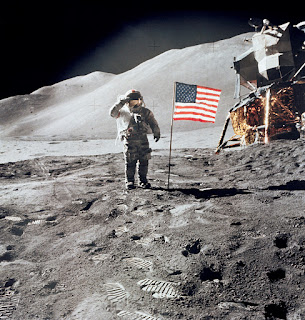We ran as if to meet the moon.
~ Robert Frost |
| "We came in peace for all mankind." |
For anyone old enough to remember living through them, the 1960s were a fraught and fractured decade. In many ways, that time was more perilous than today’s political polarization. The Cold War between the Soviet Union and the Western world stoked the fear of nuclear war. The Vietnam conflict raged and grew more bloody and controversial, inciting a bitter and passionate anti-war movement that divided and demoralized the entire country. Between the fall of 1963 and the spring of 1968, three national leaders, all full of hope and a promise of better tomorrows--President John F. Kennedy, Rev. Dr. Martin Luther King, and Robert F. Kennedy--were all brutally assassinated, shot down in their prime.
The Civil Rights movement caused terrible social unrest, violence, and many deaths. In 1965, the lingering curse of racial strive erupted in destructive riots in Watts, a Los Angeles neighborhood.. Race riots continued in Detroit in 1967, and in many U.S. cities throughout the decade.
In 1968, almost exactly one year before the moon landing, there were violent riots in the streets at Chicago’s Democratic presidential convention protesting the Vietnam war. Demonstrators, as well as news reporters and doctors who had come to assist, were beaten and gassed by police. In the 1960s, it seemed as though America would never be at peace, either at home or abroad.
Throughout this turbulent decade, 1960-1969, one shining silver thread ran its unifying way throughout the dark tapestry of domestic angst and upheaval: the NASA space programs. The initial Mercury program was proof of concept that we could put astronauts into space and orbit around the earth and see them successfully return. The Gemini program, with its dramatic “space walks,” followed as practice and preparation for astronauts who would actually visit the moon. The Apollo program had the actual moon landing as its mission; it was not without its tragedies. But the U.S. persevered in its mission; that's what Americans do. The vast majority of Americans in the 1960s, despite all their dramatic differences of opinion, were enthusiastic supporters of the space program. It seemed to be our national candle in the darkness, a light we could all see and focus on together.
It was in 1961 that President Kennedy had pledged to put an American on the moon by 1970. It happened. Americans reached for the moon, and we touched it. It is an enduring achievement of which every American should be immensely proud.